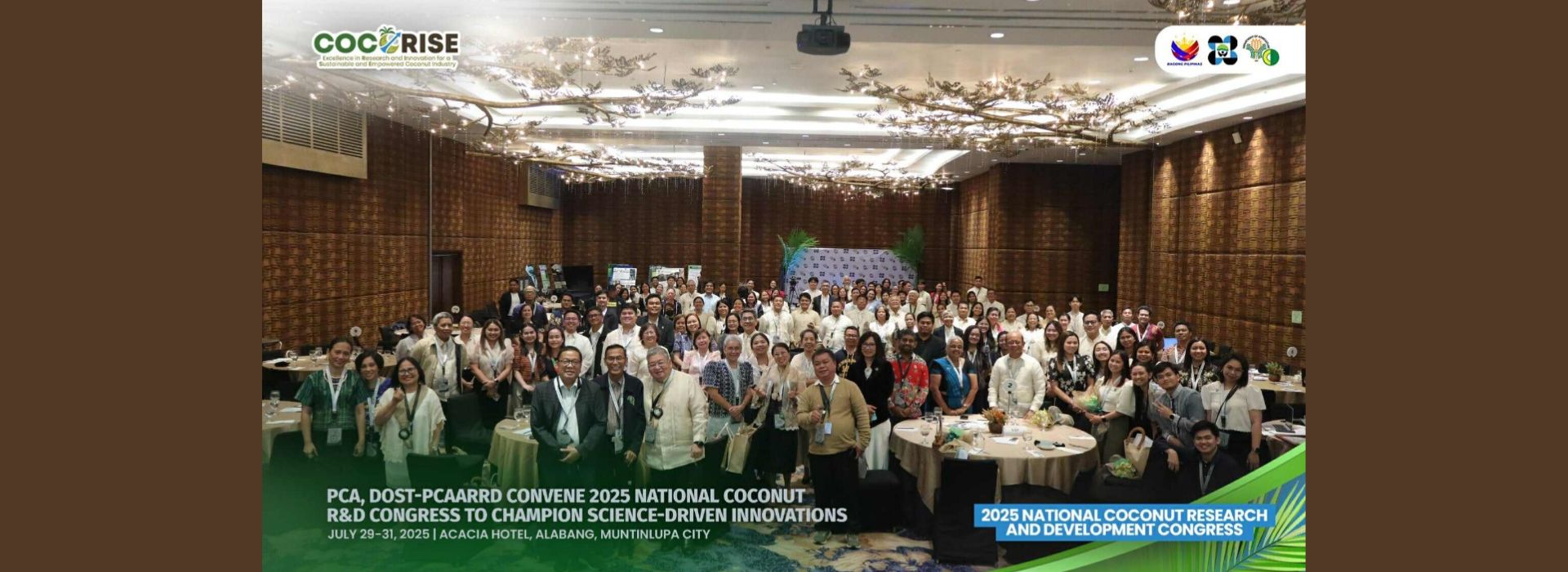The International Coconut Community (ICC) actively participated in the 2025 National Coconut Research and Development Congress (NCRDC) held from 29–31 July 2025 at the Acacia Hotel, Alabang, Muntinlupa City, Philippines. The event was jointly organized by the Philippine Council for Agriculture, Aquatic and Natural Resources Research and Development of the Department of Science and Technology (DOST-PCAARRD) and the Philippine Coconut Authority (PCA). With the theme “COCORISE: Excellence in Research and Innovation for a Sustainable and Empowered Coconut Industry”, the Congress served as a national platform for the exchange of research findings, innovative technologies, and policy directions aimed at revitalizing the coconut industry through science-driven solutions.

The Congress opened with inspiring messages from key leaders, including Hon. Renato U. Solidum Jr., Secretary of the Department of Science and Technology; Hon. Francisco P. Tiu Laurel Jr., Secretary of the Department of Agriculture; Dr. Reynaldo V. Ebora, Executive Director of DOST-PCAARRD; and Dr. Dexter R. Buted, Administrator of the Philippine Coconut Authority. In his keynote address, Dr. William G. Padolina, Academician of the National Academy of Science and Technology and former DOST Secretary, underscored the need for research that not only advances technology but also responds to the realities faced by coconut farmers. He emphasized that sustainable progress requires bridging the gap between laboratory innovations and practical applications in the field, ensuring that farmers are empowered to adopt improved technologies and benefit from their outputs.

Representing ICC at the Congress were Dr. Jelfina C. Alouw, Director General, and Mr. A.H.N. Chinthaka, Deputy Director General. Dr. Jelfina was invited as a plenary speaker in the session “From Lab to Field: Accelerating Coconut Innovation toward Economic and Social Change”, where she delivered a presentation titled “Bridging Innovation and Applications through Technology Transfer and Evidence-Based Policies.” In her address, Dr. Jelfina highlighted a strategic framework integrating three interdependent pillars, technological innovations across the coconut value chain, a cooperative-centric hybrid model for technology transfer, and the use of evidence-based policies to guide sector interventions. She described this integration as the “Tech-Policy-Cooperative Nexus”, a virtuous cycle where sound policy empowers farmer cooperatives, cooperatives facilitate technology deployment, and field-generated data informs future policies. Drawing from ICC’s regional experience, she stressed that technology adoption must be user-centered, affordable, demonstrable, and supported by robust institutional partnerships. She also cited successful models such as the use of Farmer Field Schools combined with digital platforms and public-private research collaborations to accelerate adoption.

The three-day program featured a rich mix of plenary sessions, oral presentations, poster displays, and technology pitching. Plenary topics covered areas such as conservation of coconut genetic resources, advances in biotechnology and genomics, integrated farm management practices, eco-friendly pest control, private sector engagement, and enabling policies for the coconut industry. Technical sessions highlighted upstream and downstream research outputs, ranging from breeding and genetics to postharvest processing and utilization. The poster presentations provided a visual showcase of innovations and field research, while the technology pitching session introduced new products and tools, including biocontrol agents, mobile applications for farm data collection, coconut-based food innovations, and mechanical equipment to improve farm efficiency. This segment fostered dialogue between researchers, potential investors, and industry players, with the aim of accelerating the commercialization of promising technologies.
During the visit, the ICC delegation also held a high-level meeting with PCA Administrator Dr. Dexter R. Buted, who serves as the ICC National Liaison Officer for the Philippines. The meeting was attended by PCA Deputy Administrator for Operations, Mr. Roel M. Rosales; ITAG 4 Leader and coconut tissue culture expert, Dr. Vijitha R.M. Vidhanaarachchi; PCA tissue culture scientist Dr. Cristeta A. Cueto; and Ms. Maria Elizabeth B. Naredo of PCA’s Research and Development Branch. The discussion focused on the progress of the Philippines’ national coconut program, with particular emphasis on the massive replanting initiative targeting the planting of 100 million coconut palms by 2028. Dr. Buted outlined the program’s implementation strategies, which combine traditional seednut-based propagation with advanced biotechnology, including tissue culture, to ensure the availability of quality planting materials.

The conversation also explored opportunities for deeper ICC–PCA collaboration. Dr. Buted reaffirmed the Philippines’ commitment to host the 52nd International COCOTECH Conference in 2026, and proposed using the conference as a platform to share the latest developments and innovations from ICC member countries, thereby fostering mutual learning and benefiting the entire coconut community. A significant portion of the meeting was devoted to discussing the potential of coconut tissue culture technology. Dr. Cueto and Ms. Naredo shared updates on ongoing research and scaling-up efforts, while Dr. Vidhanaarachchi emphasized the need for broader international cooperation to overcome technical challenges and achieve commercial-scale production. Dr. Buted suggested that ICC could spearhead the organization of an international event dedicated solely to coconut tissue culture, bringing together global experts, research institutions, and industry stakeholders to accelerate development, standardization, and adoption of this critical technology.
The ICC delegation commended PCA and DOST-PCAARRD for the successful organization of the Congress, which not only celebrated scientific achievements but also strengthened linkages among researchers, policymakers, industry leaders, and farmers. The event underscored the vital role of integrated research, inclusive policy frameworks, and effective technology transfer in securing a sustainable and competitive future for the coconut industry.

